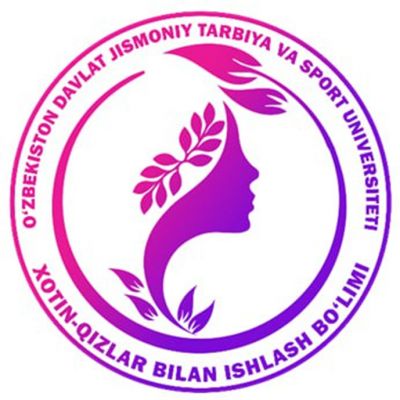After the Republic of Uzbekistan gained independence, on December 27, 1991, the Women’s Committee of Uzbekistan was established as a public organization at the Women's Conference in Termez. Initially known as the Republican Women’s Committee, its first chairperson was Halima Khudoyberdieva. In 1995, the position of the chairperson was elevated, and it was decided that the chairperson would also serve as the Deputy Prime Minister of the Republic of Uzbekistan. The regional departments operated under the respective local governments.On May 25, 2004, a presidential decree was adopted outlining new measures to support the activities of the Women’s Committee. In connection with this, Women’s Councils were also established in higher educational institutions. Specifically, the Women's Council started its work at the Uzbekistan State University of Physical Education and Sports. From 2004 to 2018, Svetlana Inomova, Farida Akbarova, Elmira Bositxonova, and Tanzila Norboeva led this system. From March 1 to December 30, 2022, Zulakho Makhamova served as the Chairperson of the State Committee for Family and Women. On December 21, 2022, by a Presidential Decree, this committee was included in the Ministry of Poverty Reduction and Employment. Since January 31, 2023, Zulakho Makhamova has been leading the Family and Women’s Committee. Furthermore, on December 21, 2023, a Presidential Decree transferred the Family and Women’s Committee back under the jurisdiction of the Cabinet of Ministers.
Establishment of the Department for Working with Women at the University
At the Uzbekistan State University of Physical Education and Sports, the Women’s Council was initially led by M.S. Aykhodzhayeva. Later, this position was held by M.S. Meliyeva, G. Alikhodzhayeva, N. Rizayeva, B.B. Badalova, M. Khaydarova, H. Akhmedova, N. Mirjamalova, M. Ghaniyeva, and currently, Sh. Aliyeva continues to hold the position.According to the university rector’s order No. 42/1 dated February 1, 2024, and the university council’s decision No. 6 dated January 31, 2024, the Department for Working with Women was officially incorporated into the Youth Policy and Spiritual-Educational Affairs Department. Currently, the department is led by D. Ismailova.Today, our university has 401 qualified professors and teachers, 188 of whom hold academic degrees and titles. Among them, 103 are PhD holders, 19 hold the DSc academic degree, and 66 are associate professors and professors with scientific titles.Notably, the participation of women in the development of science and research is expanding. At present, 43 female specialists are contributing to the development of education and science at our university, including 1 DSc professor, 1 DSc associate professor, 25 PhD associate professors, and 16 professors and associate professors.The year 2024 has been a year of significant scientific achievements for our university. In 2024, 1 female scholar successfully defended her Doctor of Pedagogical Sciences (DSc) degree, and 4 female scholars earned their PhD degrees in Pedagogical Sciences. Additionally, another female professor received the title of professor, and 5 female teachers were awarded the title of associate professor.These achievements indicate that the process of scientific research and qualification enhancement at our university continues to progress steadily, opening new opportunities and prospects for the academic community.
Supporting Female Professors and Educators
Supporting the professional development of female educators and researchers working in higher education institutions.Creating favorable conditions for scientific and research activities. Providing flexible work schedules and a comfortable work environment for women.
Main Goals and Objectives of the Department
The Department for Working with Women was established to ensure the active participation of female students in the educational process, support their legal, social, spiritual, and professional development, and strengthen gender equality. The department ensures the effective implementation of state policies aimed at supporting women, protects their rights and legal interests, and works systematically to increase their role in the social and political life of the country.
- Activating the participation of women in the workforce, state, and public administration, implementing targeted projects to support them socially and legally, and regularly monitoring their opinions.
- Identifying women’s issues in a timely manner, identifying female students and employees who are in need of assistance or facing social difficulties, including those with disabilities, and developing mechanisms to provide social, legal, psychological, and material support, as well as rehabilitation services.
- Monitoring and improving the implementation of legal guarantees for equal rights and opportunities for both women and men, and developing proposals to improve these processes.
- Monitoring the implementation of laws aimed at protecting women from abuse and violence, identifying victims, and developing measures for rehabilitation and the protection of their rights, as well as submitting recommendations to the rectorate.
- Developing and participating in regional programs for protecting women from abuse and violence.
- Preparing female students for family life, increasing the social activity of young families, and promoting the activities and lifestyles of women engaged in socially useful labor and leading exemplary lives.
- Organizing various competitions and sports events for women, ensuring transparency and fairness in the process of awarding the Zulfiya State Prize and the "Honorable Woman" badge.
- Ensuring the practical application of documents, standards, and requirements related to the protection of women's rights within the framework of national and international law, and participating directly in this process.
- Recognizing the services of female employees who work effectively at the university and recommending them for state awards.
The main goal of the Department for Working with Women is to create favorable conditions for female students to receive quality education, achieve professional development, and be socially and legally protected. The department also aims to help them take an active role in society. Through this, women are not only able to participate successfully in the educational process but also have the opportunity to engage equally in various sectors of society.


 English
English
 O`zbek tili
O`zbek tili Русский
Русский
